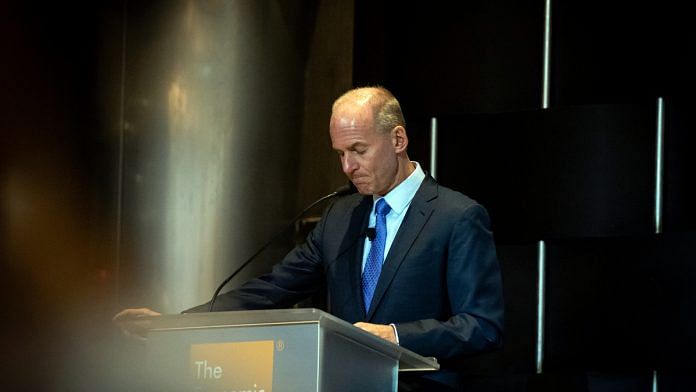Two years ago, Boeing Co. could do no wrong. Lately, it can do nothing right, and someone had to pay the price.
That person turned out to be Chief Executive Officer Dennis Muilenburg. Boeing announced on Monday that he was resigning because the board had decided a change in leadership “was necessary to restore confidence in the company” after two fatal crashes and a worldwide grounding of its best-selling 737 Max jet. Muilenburg will be succeeded by David Calhoun, who assumed the chairman title from him in October. The directors are right to make this change, of course. But it’s amazing that it took the extension of the grounding to nine months; a rare and surprisingly indignant public admonishment from the Federal Aviation Administration over perceived pressure from the company; and ultimately a full Max production halt for the board to be convinced a serious change was necessary. Boeing replaced Kevin McAllister as head of the commercial airplane division in October, but as far as sacrifices go, that was never going to be enough.
Much of the blame for the current crisis has fallen on Muilenburg, and he certainly made mistakes. An engineer by training, he led Boeing into a true engineer’s response to the early days of the crisis, missing the human element of the tragedy and the need for accountability. An April statement from Muilenburg attributed the crashes to a “chain of events” of which the Boeing flight-control software system, which triggered the Max jets’ nosedives, was only one. He was the public face of Boeing throughout the crisis and yet in two testimonies before Congress, he appeared unfathomably out of the loop on the day-to-day workings of his company. His name is attached to the aggressive timelines for the Max’s return that Boeing continued to put forth even as its earlier estimates proved hopelessly optimistic.
Also read: Boeing without 737s is like Coca-Cola without Diet Coke
But it is wrong to look at the Max crisis as the fault of just one man. The tragedy has exposed deep-rooted flaws in Boeing’s relationship with regulators, its internal oversight policies, the lines of communication between engineers and executives and its relentless push for higher profits and cash flow.
Muilenburg was especially dogged in squeezing suppliers for cost cuts to capture some of their rich profit margins for Boeing. He also pressed a trade spat with Bombardier Inc. that led former Airbus SE CEO Tom Enders to accuse the company of being a nationalist bully. But it was Muilenburg’s predecessor, Jim McNerney, who started the first so-called Partnering for Success program to pressure suppliers into discounts; the targets of this called it “Pilfering from Suppliers.” McNerney was also CEO when Boeing moved its flight simulators from Seattle to Miami in 2013 and began outsourcing some training to contractors. In practice, this significantly reduced the communication between cockpit designers and the instructors who had a better understanding of how a typical airline pilot would react to various situations, as reported by Peter Robison and Julie Johnsson for Bloomberg Businessweek. McNerney also made the decision to retrofit the decades-old 737 design with more fuel-efficient engines to get a competitor to Airbus’s fast-selling A320neo model to market faster. The flight-control software system linked to the two Max crashes helped balance out the aerodynamic impact of the large engines, which had to be placed further forward and higher up.
Muilenburg certainly deserves to take the fall for the Max crisis, but he is also a convenient scapegoat for more pervasive cultural shortcomings. It reminds me a lot of General Electric Co., and I don’t think it’s a coincidence that McNerney and the new CEO, Calhoun, are alumni. The roots of GE’s recent crisis can be traced back to the corporate sprawl and constant push for higher profits engineered by Jack Welch. Jeff Immelt inherited that now-dubious legacy, and while he belatedly tried to rein in the sprawl, he carried on the profit-first mentality with different, but also disastrous, results. Boeing shares are rallying on Muilenburg’s ouster, but the company is overdue for a cultural reckoning of GE-like proportions. – Bloomberg
Also read: Boeing halts max line but Airbus can’t make jets fast enough



